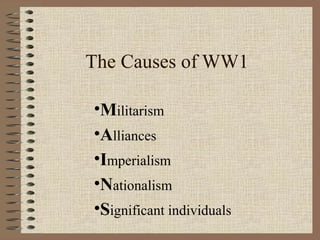
The causes of the ww1
- 1. The Causes of WW1 •Militarism •Alliances •Imperialism •Nationalism •Significant individuals
- 2. Militarism 1. • Germany was competing with the UK to build battleships. • The British feared an attack on their Empire.
- 3. Militarism 2. • Germany was competing with Russia and France to expand their armies 1880 1914 • Germany 1.3m 5.0m • France 0.73m 4.0m • Russia 0.40m 1.2m
- 4. Militarism 3. • In all countries, navies and armies were growing a lot very powerful preparing for what it was “bound to come”. • Germany made an agreement with Italy, which established that Italy should stay neutral if war broke out between Austria- Hungary and Russia. Germany would protect her.
- 5. Alliances 1. • By 1914 two alliances were formed: 1)The Triple Entente. Conformed by Britain, France and Russia. 2)The Triple Alliance. Conformed by Germany, Italy and Austria-Hungary.
- 6. Alliances 2. • By 1914 all the major powers were linked by a system of alliances. • The alliances made it more likely that a war would start. • Once started, the alliances made it more likely to spread.
- 7. The Triple Entente • Russia: She was the biggest and most backward country. She didn´t have neither a good army nor a good industry. She was worried about Germany´s power. She los a war against Japan in 1905. • Britain: She had the best navy. She was worried about the growth of Germany. She didn´t want to get involved in any conflicts, its attitude was known as “Splendid Isolation”
- 8. • France: She had been defeated by Germany in 1870 and an industrial area called “Alsace-Lorraine was stolen by Germany. She was worried about a German attack. They were the best as regards submarines.
- 9. The Triple Alliances • Germany: She was a collection of small states. She won a war against France in which she stole Alsace-Lorraine. She had an ambitious leader called Kaiser Wilhelm II. They were growing a lot as an empire. They were worried about the “Encirclement” which was an attempt to attack her from both sides by France and Russia.
- 10. • Italy: She was a very young country and not so reliable. She was a collection of small states. Its main concern was to have its goverment established. • Austria-Hungary: She was a sprawling empire in central Europe. She also was a collection of small states. Her main concern was to keep her empire together, because many small countries wanted to be independent from her.
- 11. Imperialism • All the great powers were competing for colonies / territory. • The British feared Germany in Africa. • The Austrians feared Serbia / Russia in the Balkans.
- 12. Nationalism • This was an age when all nations wanted to assert their power and independence. • In Europe Slavs, aided by Serbia and Russia, wanted to be free of Austrian rule. Serbia’s national flag
- 13. Unifications • Unification of Italy in 1861. • Unification o Germany in 1871. International tension was greatly increased by the division of Europe into two armed camps.
- 14. Significant Individuals 1. • Kaiser Wilhelm II • Built up German army and navy • Aggressive foreign policy • Determined to make Germany a top nation. • Distrusted by other powers “Germany must have its place in the sun” “The world belongs to the strong.”
- 15. Significant Individuals 2 • Count Berchtold • Austrian Prime Minister. • During the July Crisis, decided on a very tough ultimatum for Serbia “Were the Serbs to agree to all the demands, this would not be to my liking”
- 16. Significant Individuals 3 • Bethmann Hollweg • German Prime Minister • Gave very strong support to Austria during the July crisis while Kaiser was cruising on his yacht “The Austrian demands are moderate. Any interference by Britain, France and Russia would be followed by incalculable consequences”
- 17. The Crisis 1. • 28 June 1914 • Heir to Austrian throne Franz Ferdinand visits Sarajevo. • Capital of Bosnia, recently grabbed by Austria. • Hotbed of Slav nationalism Seal of the Black Hand group
- 18. The Crisis 2. • “Black Hand” terrorists attack the Arch Duke • Bomb attempt fails in morning • Gavrilo Princip shoots Archduke and wife in the afternoon. • Austrians blame Serbia for supporting terrorists.
- 19. The Crisis 3. • Austrians, supported by Germany, send Serbia a tough ultimatum. • Serbia agrees to all but two terms of the ultimatum. • Russia mobilises her troops to support Serbia • Germany demands that Russia stands her armies down. • Germany declares war on Russia “Demands must be put to Serbia that would be wholly impossible for them to accept …”
- 20. Why did Britain get involved? • Britain had Ententes with France and Russia. • Only “friendly agreements” but French and Russians given impression Britain would fight. • The Schlieffen Plan Sir Edward Grey British Foreign Secretary … “There’s some devilry going on in Berlin”
- 21. The Schlieffen Plan • Germany’s military plan to defeat France and Russia. • “Knock out blow” aimed at France first. • Avoid French defences by invasion of Belgium. • Germans thought Britain would not intervene.
- 22. Britain’s Reaction • 1838- UK had signed a Treaty to protect Belgium. • Britain also scared of Germany controlling Channel ports. • Did not want Germany to defeat France and dominate Europe. Britain next? • UK issued ultimatum to Germany to withdraw troops from Belgium. War declared August 4 1914.